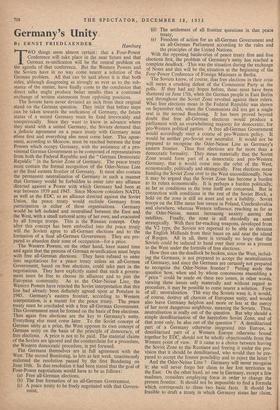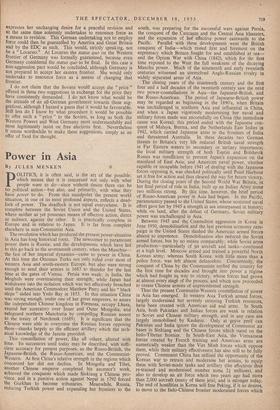Germany's Unity
TWO things seem almost certain : that a Four-Power Conference will take place in the near future and that German re-unification will be the central problem on the agenda of that conference. But the Western Powers and the Soviets have in no way come nearer a solution of the German problem. All that can be said about it is that both sides, although disagreeing as strongly as ever as to_the sub- stance of the matter, have finally come to the conclusion that direct talks might produce better results than a continued exchange of written statements from ()Nosing positions. The Soviets have never deviated an inch from their original stand on the German question. They insist that before steps can be taken towards the unification of Germany, the future status of a united Germany must be fixed irrevocably and unequivocally. Since they want to know in advance where they stand with a united Germany, the Soviets demand that a definite agreement on a peace treaty with Germany must dime first and everything else must come later. This agree- ment, according to Moscow, must be reached between the four Powers which occupy Germany, with the assistance of a pro- visional German Government to be composed of representatives from both the Federal Republic and the " German Democratic Republic " in the Soviet Zone of Germany. The peace treaty must contain the formal recognition of the Oder-Neisse Line as the final eastern frontier of Germany. It must also contain the permanent neutralisation of Germany in such a manner that Germany would be forbidden to enter into any alliance directed against a Power with which Germany had been at war between 1939 and 1945. Since Moscow considers NATO, as well as the EDC, as an alliance directed against the Soviet Union, the peace treaty would exclude Germany from participation in either of these organisations. Germany would be left isolated and neutralised between the East and the West. with a small national army of her own, and evacuated by all foreign troops. This is the Russian concept. Only after this concept has been embodied into the peace treaty will the Soviets agree to all-German elections and to the formation of a final all-German Government. They are pre- pared to abandon their zone of occupation—for a price.
The Western Powers, on the other hand, have stated time and again that the process of German re-unification must begin with free all-German elections. They have refused to enter into negotiations for a peace treaty unless an all-German Government, based on free elections, could take part in the negotiations. They have explicitly stated that such a govern- ment must be free to choose its alliances and to join the European community. As to the Oder-Neisse Line, the Western Powers have rejected the Soviet interpretation that this line had already been definitely agreed upon at Potsdam in 1945. Germany's eastern frontier, according to Western interpretation, is a matter for the peace treaty. The peace treaty must be concluded with a free all-German Government. This Government must be formed on the basis of free elections. Thus again free elections are the key to Germany's unity. Everything else must come later. To the Soviet concept of German unity at a price, the West opposes its own concept of German unity on the basis of the principle of democracy, of free elections. A price is not to be paid. The material claims of the Soviets are ignored and the counterclaim for a procedure, the Western democratk procedure, is put forward.
The Germans themselves are in full agreement with the West. The second Bundestag, as late as last week, unanimously endorsed the resolution passed by the first Bundestag on June 10th. In that resolution it had been stated that the goal of Four-Power negotiations would have to be as follows: (a) Free all-German elections, (b) The free formation of an all-German Government, (c) A peace treaty to be freely negotiated with that Govern- ment, (d) The settlement of all frontier questions in that peace treaty, (e) Freedom of action for an all-German Government and an all-German Parliament according to the rules and the principles of the United Nations. With the opposing battle-cries of peace treaty first and free elections first, the problem of Germany's unity has reached a complete deadlock. This was the situation during the exchange of Notes and this will be the, situation at the beginning of the Four-Power Conference of Foreign Ministers in Berlin.
The Soviets know, of course, that free elections in their zone will mean a crushing defeat of the Communist Party at the polls. If they had any hopes before, these must have been shattered on June 17th, when the German people in East Berlin and 'throughout the Soviet Zone revolted against their rulers. What free elections mean in the Federal Republic was shown on September 6th, when the Communists did not get a single seat in the second Bundestag. It has been proved beyond doubt that free all-German elections would produce a parliament with an overwhelming majority for democratic, for pro-Western political parties. A free all-German Government would accordingly steer a course of pro-Western policy. It would be neither pro-Soviet nor neutralist. It would not be prepared to recognise the Oder-Neisse Line as Germany's eastern frontier. Thus free elections are far more than a democratic formality. They mean materially that the Soviet Zone would form part of a democratic and pro-Western Germany, that it Would come into the orbit of the West, economically, politically and strategically. Free elections mean handing the Soviet Zone over to the West unconditionally. Now it may be argued that the Soviet Zone has become a burden to its rulers economically. It is perhaps a burden politically, as far as conditions in the zone itself are concerned. But in connection with conditions in the rest of the Soviet Block, a hold on the zone is still an asset and not a liability. Soviet troops on the Elbe mean less unrest in Poland, Czechoslovakia and elsewhere, whereas Western influence, reaching as far as the Oder-Neisse, means increasing anxiety among the satellites. Finally, the zone is still decidedly as asset strategically. With their far-reaching weapons, developed from the V2 type, the Soviets are reported to be able to threaten the English Midlands from their bases on and near the island of Ruegen. All in all, there is virtually no hope that the Soviets could be induced to hand over their zone as a present to the West under the formula of free elections. • How then can the deadlock be broken, since the West, includ- ing the Germans, is not prepared to accept the neutralisation of Germany, and since the Germans are certain14 not prepared to recognise the Oder-Neisse frontier ? Putting aside the question how, when and by whom concessions resembling a price " could be made on these two issues, in other words, viewing these issues only materially and without regard to procedure, it may be possible to come nearer a solution. First of all: neutralisation. The way the Soviets want it, it would, of course, destroy all chances of European unity, and would also leave Germany helpless and more or less at the mercy of her most dangerous neighbour, meaning the Soviets. Thus, neutralisation is really out of the question. But why should a simple demilitarisation of the heretofore Soviet Zone, and of that zone only, be also out of the question ? A demilitarised part of a Germany otherwise integrated into Europe, a demilitarised part of a Western Europe otherwise bound together by EDC, should not be wholly objectionable from the Western point of view. If it came to a choice between leaving the Soviet Zone to the Russians, and freeing it under the pro- vision that it should be demilitarised, who would' then be pre- pared to accept the former possibility and to reject the latter ?
And the Oder-Neisse Line ? Germany will never recognise it; she will never forgo her claim to her lost territories in the East. On the other hand, no one in Germany, except a few madmen, considers employing force in order to change the present frontier. It should not be impossible to find a formula which corresponds to these two basic facts. It should be feasible to draft a treaty in which Germany states her claim, expresses her unchanging desire for a peaceful revision and at the same time solemnly undertakes to renounce force as a means to revision. This German undertaking not to employ force could then be guarantied by America and Great Britain and by the EDC as such. This would, strictly speaking, not be a " Locarno." At Locarno the status quo on the Western frontier of Germany was formally guaranteed, because even Germany considered the status quo to be final. In this.case a non-aggression pact would be concluded, although Germany is not prepared to accept her eastern frontier. She would only undertake to renounce force as a means of changing that frontier.
I do not claim that the Soviets would accept the " price " offered in these two suggestions in exchange for the price they have consistently demanded. I do not know what would be the attitude of an all-German goverhment towards these sug- gestions, although I hazard a guess that it would be favourable. Still less do I know by what procedure it would be possible to offer such a ",price " to the Soviets, as long as both the Western Powers and West Germany most understandably and most legitimately insist on free elections first. Nevertheless it seems worthwhile to make these suggestions, simply as an offer of food for thought.











































 Previous page
Previous page